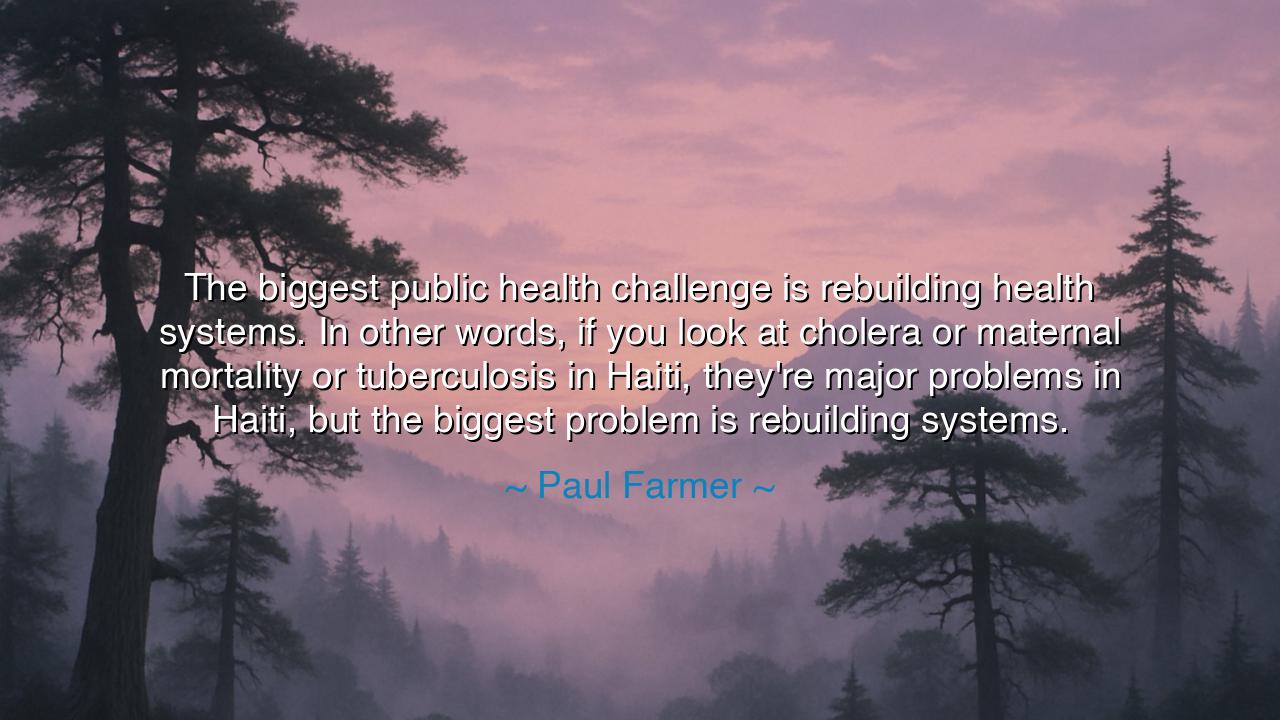
The biggest public health challenge is rebuilding health systems.
The biggest public health challenge is rebuilding health systems. In other words, if you look at cholera or maternal mortality or tuberculosis in Haiti, they're major problems in Haiti, but the biggest problem is rebuilding systems.






The words of Paul Farmer — “The biggest public health challenge is rebuilding health systems. In other words, if you look at cholera or maternal mortality or tuberculosis in Haiti, they're major problems in Haiti, but the biggest problem is rebuilding systems.” — are not merely the reflections of a physician, but the lament of a healer who has looked into the heart of human suffering and seen that disease is only the shadow of something deeper. Beneath his calm reasoning lies a truth both ancient and profound: it is not enough to cure the sick; one must heal the world that makes them sick.
Farmer, who spent his life among the poor and forgotten, understood that epidemics are not random misfortunes — they are the consequences of broken systems, of injustice made flesh. Cholera, tuberculosis, and the deaths of mothers in childbirth are not solely biological tragedies; they are the visible scars of societies that have allowed inequality, poverty, and neglect to eat away at the very structures meant to protect life. When he speaks of rebuilding systems, he speaks not of walls or hospitals alone, but of restoring trust, equity, and dignity — the true foundations of public health.
The origin of these words can be traced to Farmer’s tireless work in Haiti, a land both beautiful and broken, where centuries of exploitation had left its people impoverished and its institutions fragile. When the earthquake of 2010 struck, the devastation was not only in the rubble of buildings but in the collapse of the nation’s fragile health system. Farmer saw firsthand that medicines and volunteers, though noble and necessary, were not enough. For every cholera patient treated, another would appear, not because the doctors lacked skill, but because the system that prevented sickness had been shattered. His insight — born from years in the field — was that without rebuilding the pillars of infrastructure, governance, and education, the cure could never outpace the cause.
This wisdom is not new. In the aftermath of the Black Death in medieval Europe, cities learned a similar lesson. When the plague passed, the wisest among them did not simply bury their dead; they built aqueducts, cleaned streets, and established laws for sanitation. They understood, as Farmer did, that health is not the work of doctors alone, but of societies. A healthy people rise from the cooperation of all — builders, leaders, teachers, and healers alike. Disease, in truth, is not only the failure of the body, but the failure of community.
Farmer’s voice, though rooted in Haiti, speaks to all nations. The greatest enemy of health is not disease, but neglect — the quiet, corrosive indifference that lets systems decay until suffering becomes routine. Where there are broken hospitals, there are broken promises. Where mothers die for lack of care, there is the echo of centuries of inequality. He reminds us that rebuilding health systems is not just about constructing clinics or training doctors, but about restoring faith — that every human life is worth saving, that every community deserves the power to care for its own.
There is also humility in his teaching. He does not blame the sick for their illness or the poor for their poverty. Instead, he calls upon those who have power and privilege to use it for the common good. To rebuild systems is to weave the fabric of solidarity, thread by thread, between nations and peoples. It is to see that no one truly lives well while others suffer preventable pain. As he often said, “The idea that some lives matter less is the root of all that is wrong with the world.” His vision of rebuilding is, therefore, both medical and moral — a call to awaken our shared responsibility.
So, my children of the modern age, remember this: healing is more than curing. Do not look only to the symptom, but to the soil from which it grows. When you see a child without medicine, ask what system failed that child; when you see a village without clean water, ask what history allowed it. The truest healer is not the one who closes a wound, but the one who prevents it from reopening. To rebuild systems is to build justice itself.
And thus, the words of Paul Farmer endure as a torch for all who serve: that compassion must be organized, that love must take the shape of policy and infrastructure, and that no medicine can save a people if the system that sustains them remains broken. For in the end, the health of a nation is not measured by its hospitals, but by its humanity — by how fiercely it refuses to abandon its most vulnerable, and how boldly it chooses to build a world where every life, no matter how poor or distant, has a chance to thrive.






AAdministratorAdministrator
Welcome, honored guests. Please leave a comment, we will respond soon